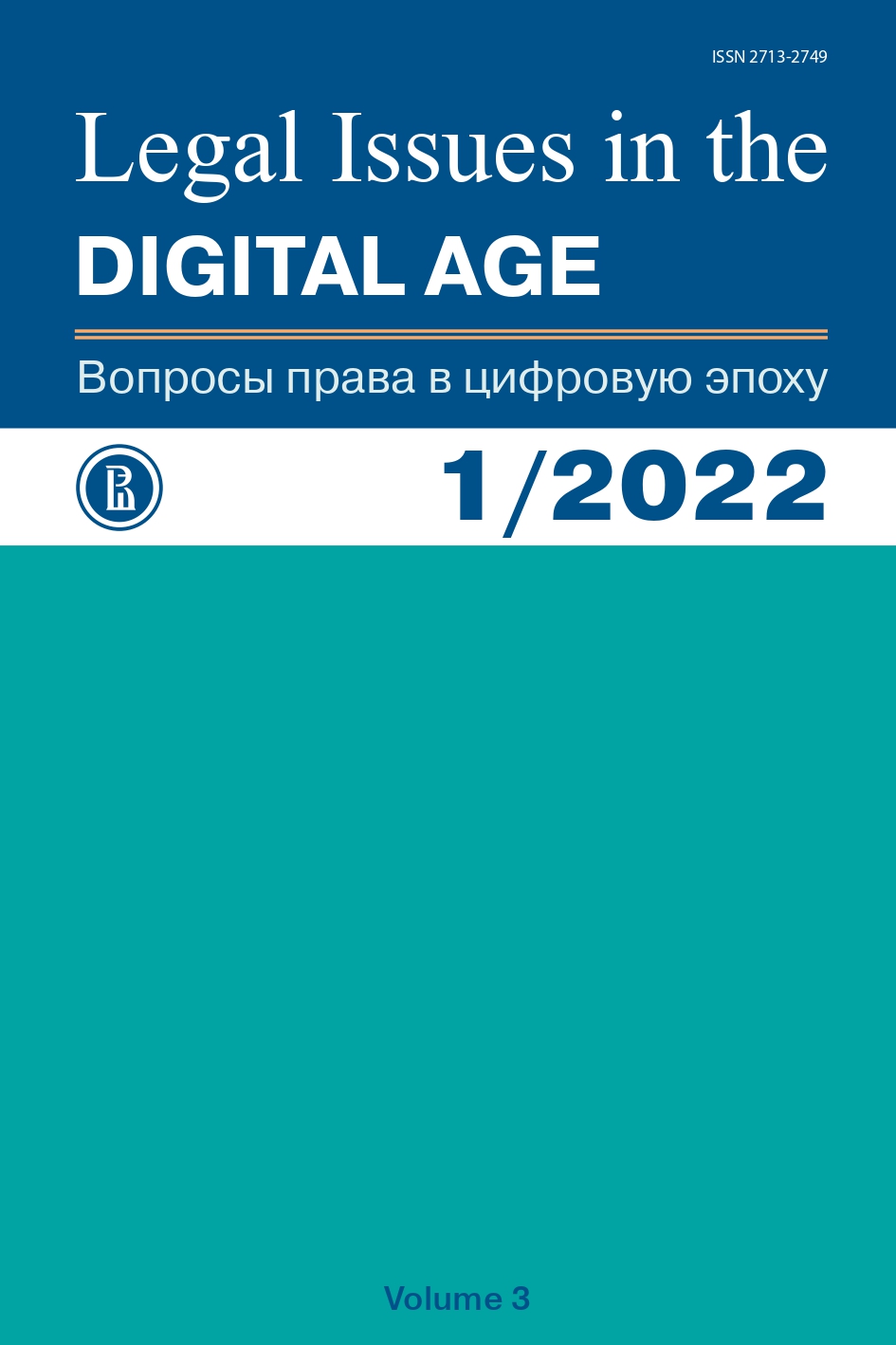Standard-setting and Normativity in International Governance of Interstate Relations in the Information and Communication Technologies Context
Abstract
The paper considers how the standard-setting path, taken by states with respect of the information and communication technologies (hereinafter: ICTs), correlates with the normativity in international governance of this sphere. The pro-normative reading of this question pushes to examine whether this path designates a prelawmaking phase, contributes to the interpretation of the lex lata general norms, or fills in the gaps that cannot be covered by the orthodox international lawmaking. The counter-normative reading assesses whether the standard-setting path precludes, contests, freezes, or substitutes the lawmaking. In order to fulfill these tasks, the author concentrates on two standard-setting sources: the ‘non-binding norms, rules, and principles of responsible state behaviour’ adopted by the UN level in relation to ICTs related context and International Code of Conduct for Information Security, drafted by the states–members of the Shanghai Cooperation Organization. The paper reveals that ‘non-binding norms, rules, and principles’ elaborated at the UN level do not change the scope of binding provisions of International law. Thus, the content of these standards did not generate any ‘added value’ with respect to the negative and positive obligations of the states. Moreover, these standards cannot serve as an interpretation or understanding as to how existing international law applies to ICTs precisely because of the caveat made by the states with respect to the additional, subordinated role of these norms, rules, and principles. Such constellation puts in place a ‘normative gap scenario’ showcasing that for the many states the legal uncertainty and legal gaps are a more profitable constellation. However, should the states follow the standard-setting track and adhere to the non-binding norms, provided that they are relaxing existing legal obligations of states, this ‘deviation scenario’ will also erode the normativity of International law. A solution can be found in the stage-by-stage shift from the standard-setting to the law-creating track. Already elaborated norms, rules, and principles of responsible state behaviour allow this shift for. It can happen in two stages: at the level of content and then with respect to the nature of these norms.
References
Akande D., Coco A., Dias T. (2022) Drawing the Cyber Baseline: The Applicability of Existing International Law to the Governance of Information and Communication Technologies. International Law Studies, no. 4, pp. 4–36.
Carr J. (2011) Four Problems with China and Russia’s International Code of Conduct for Information Security. Available at: http://jeffreycarr.blogspot.com/2011/09/4-problems-with-china-and-russias.html.
D’Aspremont J. (2011) Formalism and the Sources of International Law. A Theory of the Ascertainment of Legal Rules. Oxford: University Press, 266 p. DOI: https://doi.org/10.1093/acprof:oso/9780199696314.001.0001
D’Aspremont J. (2016) Cyber Operations and International Law: An Interventionist Legal Thought. Journal of Conflict and Security Law, no. 3, pp. 575–593. DOI: https://doi.org/10.1093/jcsl/krw022
Delerue F. (2020) Cyber Operations and International Law. Oxford: University Press, 549 p. DOI: https://doi.org/10.1017/9781108780605
Dias T., Coco A. (2022) Cyber Due Diligence in International Law. Oxford: Institute for Ethics, Law and Armed Conflict, 256 p.
Doerr O., Schmalenbach K. (eds.) (2018) Vienna Convention on the Law of Treaties: A Commentary. Berlin: Springer, 1535 p. DOI: https://doi.org/10.1007/978-3-662-55160-8
Grigsby A. (2015) Will China and Russia’s Updated Code of Conduct Get More Traction in a Post-Snowden Era. Available at: https://www.de-fenseone.com/voices/alex-grigsby/10825
Hollis D. (2020) Improving Transparency. International Law and State Cyber Operations. Fourth report to the Organization of American States. OEA/Ser.Q. CJI/doc. 603/20. Available at: http://www.oas.org/en/sla/iajc/current_agenda_Cyber-security.asp
Koh H.H. (2012) International Law in Cyberspace. Harvard International Law Journal Online, no. 54, pp. 1–12.
McKune S. (2015) An Analysis of the International Code of Conduct for Information Security. Available at: https://citizenlab.ca/2015/09/in-ternational-code-of-conduct
Mueller M. (2011) Russia & China Propose UN General Assembly Resolution on “Information Security”. Available at: https://www.inter-netgovernance.org/2011/09/20/russia-china-propose-un-general-as-sembly resolution-on-information-security/.
Schmitt M.T. (ed.) (2017) Tallinn Manual on the International Law Applicable to Cyber Operations. Cambridge: University Press, 598 p. DOI: https://doi.org/10.1017/9781316822524
Schondorf R. (2020) Israel’s Perspective on Key Legal and Practical Issues Concerning the Application of International Law to Cyber Operations. Available at: https://www.ejiltalk.org/israels-perspective-on-key-legal-and-practical-issues-concerning-the-application-of-internation-al-law-to-cyber-operations/
Segal A. (2012) China, International Law, and Cyberspace. Available at: https://thediplomat.com/2012/10/china-international-law-and-cyberspace
Shackelford S., Russell S., Kuehn A. (2016) Unpacking the International Law on Cybersecurity Due Diligence: Lessons from the Public and Private Sectors. Chicago Journal of International Law, no. 17, pp. 1–50. DOI: https://doi.org/10.2139/ssrn.2652446
Yeung K. (2017) ‘Hypernudge’: Big Data as a Mode of Regulation by Design. Information, Communication&Society, no. 1, pp. 118–136. DOI: https://doi.org/10.1080/1369118X.2016.1186713
Zinovieva E. (2019) International cooperation in the field of informa-tion security: subjects and trends. Available at: https://mgimo.ru/up-load/diss/2019/zinovieva-diss.pdf (in Russ.)
Authors who publish with this journal agree to the Licensing, Copyright, Open Access and Repository Policy.










